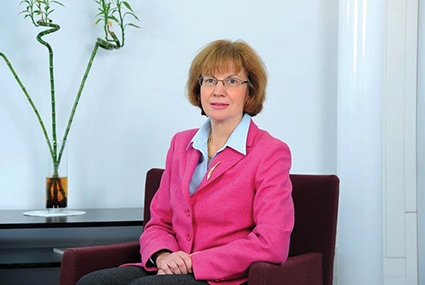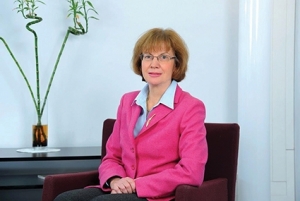German Ambassador on Georgia-German Relations
H.E. Heike Peitsch is the latest Ambassador of Germany to Georgia, though it is not her first post in the region as, in the early 2000s, she served as number one diplomat in Armenia, and then in Russia, in Moscow and Saint Petersburg. She arrived in Georgia last September.
Ambassador Peitsch admits that the Georgian hospitality has made it easy to get used to the country, to make friends and to organize meetings with government officials. And the fact that 2017 marks German-Georgian Year, the 25th anniversary of bilateral relations and 200 years since the first German colonists arrived, means there is both joy and much to be done in her first year here. GEORGIA TODAY went to meet her.
Tell us what is planned to celebrate the anniversaries this year
We’ve organized a variety of activities both in Germany and here in Georgia. The activities in Germany will last until 2018, when Georgia will be the Guest of Honor at the Frankfurt Book Fair, which is the largest book fair in the world. German-Georgian relations are not only a governmental matter but it also rely much on people-to-people relations. We’re giving a lot of attention and resources to encourage civil society to participate in the celebratory activities.
How many German colonists have returned to their historic country from Georgia? What is the general level of awareness about Georgia in Germany?
It’s difficult to say exactly how many descendants of German colonists returned to Germany from Georgia in the past decades. Since 1992, a total of around 1700 ethnic Germans from Georgia returned to Germany within a special program of the Federal Government, so-called ‘Late Re-settlers’ but prior to that, other descendants came back. When Georgia was a part of the former Soviet Union, no data was kept. Furthermore, as you know, many German colonists moved from Georgia to Central Asia and other regions during the rule of Stalin. Therefore, ethnic Germans who resettled in Kazakhstan, for instance, sometimes have a Georgian background. Keeping these things in mind, I think that it’s safe to assume that several thousand descendants of those 200 German colonists have come to Germany since 1950. Along with them, approximately 24,000 Georgians are currently living in Germany. I think that this provides a good basis for raising awareness about Georgia, and in fact this is what’s happening. Knowledge about Georgia among Germans is on the up, as is interest towards this beautiful country and culture. This is also reflected in the rising number of German tourists coming to Georgia.
Germany was the first country that recognized the restoration of Georgian independence in 1991. What does it mean in diplomatic terms?
We are always proud that we were the first country to recognize Georgian independence in 1991. This has a very concrete meaning since recognition of independence is the pre-condition of establishing diplomatic relations and opening embassies.
One of your target groups in relation-building has been youth
Currently, approximately 40,000 Georgian students study German as a foreign language throughout the country. German thus occupies a strong third place among the most popular foreign languages in Georgia – only English and Russian are more popular. Before the educational reform, which made English the first foreign language for Georgian students, around 120,000 pupils throughout Georgia studied German. This figure fell sharply to approximately 57,000 in the academic year 2011/12 and has since been declining. However, the decline has slowed significantly in the past two academic years and we’re seeing an increased interest in the German language among advanced pupils and university students.
Why is that?
I think it’s due to the many opportunities that learning German offers: worldwide, approximately 140 million people speak German as a first, second or foreign language. With approximately 100 million native speakers, German is the most widely used native language in Europe. The countries in which German is spoken as a native language represent very strong economies. Studying German thus offers a lot of employment opportunities around the world. Additionally, studying in most German universities remains free of charge as the German state pays for tuition. German language proficiency therefore also opens up tremendous education possibilities in Germany. I am quite confident that German will consolidate its third place among the most popular foreign languages in Georgia and will continue to attract many students.
Germany fully supports Georgia’s return to its historical European family. What is being done in this regard?
We’ve given much to support Georgia’s policy to return to the European family. On the bilateral level, we’ve spent EUR 800 million on programs in the framework of economic cooperation over the last 25 years. Our points of focus are strengthening the rule of law, building democracy and offering the abovementioned education opportunities as a contribution to democracy building. On the multilateral level, Germany, as a member of the EU, is very much promoting Georgia’s further approaching Euro-Atlantic structures. Georgia concluded the Association Agreement (AA) with the EU which means a very ambitious implementation agenda for Georgia. Together with partners in the EU, we’re going to support Georgia in the implementation of the AA, which is an absolute priority for Georgia on its way to Europe. Georgia has already achieved a lot. For example, the visa-liberalization did not come out of the blue- it was linked with a lot of conditions that needed to be met. Now, the AA needs to be implemented. Georgia is a part of Europe. However, there is much more to be done. The Georgian economy is still operating on a relatively low basis, but the government is well-aware of the fact and has recognized the importance of a growth-generating strategy.
In 2018, Georgia will participate in the Frankfurt Book Fair
Yes. It’s an honor for me as the Ambassador of Germany to Georgia, that my host country will be the Guest of Honor in 2018 at the Frankfurt Book Fair. This status offers Georgia a huge variety of opportunities. It’s the chance to present Georgia’s rich history, culture and literature. Georgian writer Nino Kharatishvili’s book ‘The 8th Life for Brinka’ has become a best-seller. Nino, who lives and writes in Germany, in this book tells the story of a Georgian family. A lot of my German friends have read it. With the support of the Georgian Ministry of Culture, the book is now being translated into Georgian. I’m impressed to see how actively Georgia is already preparing the Frankfurt Book Fair and I’m really looking forward to it.
Maka Lomadze











